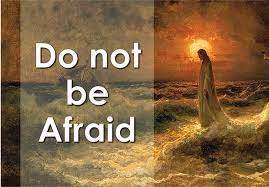19th Sunday in Ordinary Time
Edward V. Hattrick, O.S.A. 1929-2007
 It happened 30 years ago, but it seems like yesterday. I was visiting my family in the States after a 5-year stint in Japan. But now the holiday was over, tomorrow I would be returning to Nagasaki. We were having a farewell party with parents, brother and sister, and ten little nephews and nieces running about the house.
It happened 30 years ago, but it seems like yesterday. I was visiting my family in the States after a 5-year stint in Japan. But now the holiday was over, tomorrow I would be returning to Nagasaki. We were having a farewell party with parents, brother and sister, and ten little nephews and nieces running about the house.
It must have been almost nine or so. I was in the kitchen and little Sean who was only four, was standing in front of me as his mother Barbara and I were chatting. Barbara suddenly smiled at me and said, “Do you hear what Sean is saying?” He was whispering, so I bent down to listen closely: “I love you, Uncle Eddie. Uncle Eddie, I love you. I really do.” And with that he ran out of the room. I stood there, suddenly silent.
I’m reminded of Sean because of today’s first reading. To hear the whispering voice is so important and yet so easy to miss. Elijah is standing at the mouth of a cave, waiting for God to pass by. First a fierce wind blows–strong enough to shatter rocks–“but God was not in the wind.” Next comes a frightening earthquake, “but God was not in the earthquake.” This is followed by a raging fire, “but the Lord was not in the fire.” Finally there came the sound of a gentle breeze, and Elijah bent down low. “God was present in the murmuring breeze. God was speaking in a still small voice.”
St. Augustine tells us that Christ speaks to us in the Scriptures. Elijah reminds us that his voice is a very soft one indeed, and Barbara asks us if we’re listening.
And so we ask ourselves this morning: we’ve just heard the gospel story of the storm on the lake. Presumably we have listened carefully. The question is, did we hear what was being said? The still small voice of Jesus speaking to us? Or did we only hear once more the oft-told story of Jesus walking on the water? I’d be a poorer man tonight if I hadn’t grown quiet 30 years ago and listened to Sean’s wee small voice. So let’s turn again and consider more closely the story of “the ghost who walked on water.”
The scene is this: Last week as you recall, Jesus feed 5000 people with five loaves of bread and two fish. It was a lesson in how concern becomes compassion. Today Jesus dismisses the crowd, sends his disciples off in a boat, and then climbs a mountain to pray.
He must have prayed a good long while because when the story resumes, it’s after three in the morning. The ship is fighting gale-force winds, the disciples are growing desperate. Seeing this, Jesus walks over the waters to save them. Matthew tells us they see him coming, but think it’s a ghost. I used to think this was a bit far-fetched: how could they mistake their friend for a ghost? When you consider, however, that its pitch black at 3.00am and something’s approaching on wind-swept waves, a ghost is as good a guess as any. Who would ever expect a friend?
Here, then, is the first faint whisper, Jesus speaking to us today. Whenever a fierce storm rages in our hearts, whenever something really rocks the boat of our lives–it may be the death of a loved one, the solemn eyes of a doctor as he gives us the test results, the break-up of a marriage–if the news is really bad, it never occurs to us that God is with us. He may come along later to console us in our sorrow, but there’s not a ghost of a chance that he is with us now.
 Yet the story says he is present. He’s present in the storm. Not only that, but he’s saying, “Courage! It is I. Do not be afraid!” The one we call Savior saves us when we’re drowning. This is the gentle voice rustling the leaves of today’s gospel pages, whispering to us long after the original event. It’s telling us that Jesus is present in the storm even when “people or events are blowing us away, and we are rowing like mad and getting nowhere,” Christ is with us (Thomas Keating, Reawakenings [New York: Crossroad, 1992], p.22). The disciples couldn’t believe it, and neither can we.
Yet the story says he is present. He’s present in the storm. Not only that, but he’s saying, “Courage! It is I. Do not be afraid!” The one we call Savior saves us when we’re drowning. This is the gentle voice rustling the leaves of today’s gospel pages, whispering to us long after the original event. It’s telling us that Jesus is present in the storm even when “people or events are blowing us away, and we are rowing like mad and getting nowhere,” Christ is with us (Thomas Keating, Reawakenings [New York: Crossroad, 1992], p.22). The disciples couldn’t believe it, and neither can we.
Actually, however, one of the disciples did believe it. Hearing the voice, Peter said, “Lord, if it is you, tell me to come to you across the water.” And when Jesus replied, “Come,” Peter left the rocking boat and began to walk on the waves. But the wind was so strong he became frightened and began to sink. He had taken his eyes off Jesus and was looking at the waves. The actual situation flooded his mind and overwhelmed him.
Then he prayed the Peter Prayer: “Help!” he yelled, or as the Bible expresses it, “Lord, save me!” Some call this the perfect prayer, the shortest and the best. As one author put it, “The only mistake is to go down and stay down, to sink and not yell for help” (Keating, p.16).
The small voice tells us why: “Jesus at once stretched out his hand and held him.” This is what we so easily forget, that when “our initial trust begins to waver, when things get rough” (Keating, p.19), the helping hand is always there, the outstretched hand of God’s own Son. When wind and wave are about to engulf us, we need the Peter Prayer.
“It’s nice to know that we are not expected to succeed the first time we try to see difficulties from within or from without. We miss the first few times” (Keating, p.15), but that doesn’t matter. Peter had, after all, made a beginning. The next time a storm arose, his faith would be stronger. He would do better, walk further.
The other disciples hadn’t taken the risk. When Jesus cried, “Courage!” they hadn’t heeded the voice. For them, the next storm would be as daunting as the first. We have to take the first steps, however hard we fall. You learn to ride a bicycle by riding a bicycle, to swim by swimming. We learn to believe by believing. We have to take the risk of trusting. Confucius says, a turtle only gets ahead by sticking its neck out. If we do make a beginning, our faith will gradually deepen. Not only will we keep the faith, but also the faith will begin to keep us. We’ll get ahead.
 Peter shows us that faith grows through failure. His first few steps toward total trust had ended in failure. A year or two later he would fail again. He really sank that time, denying he even knew Jesus. But that time, too, he really rose again, able now to say–despite his terrible sin–“Lord, you know I love you.”
Peter shows us that faith grows through failure. His first few steps toward total trust had ended in failure. A year or two later he would fail again. He really sank that time, denying he even knew Jesus. But that time, too, he really rose again, able now to say–despite his terrible sin–“Lord, you know I love you.”
This is the real Peter Prayer: “Lord, you know I love you.”
For the most part, it’s in the little things in life that Christ whispers to us, in the Seans and Barbaras who speak to us, in the sad departures all of us must make. It’s in our everyday lives with its minor disappointments and frustrations that we must be attuned to the gentle voice Elijah heard. So don’t look for God in miracles. Listen for his voice in your daily life. Cultivate a silent heart so you can hear his voice, soft as a small child’s, gentle as a breeze, familiar and comforting even in the very midst of danger and brokenheartedness.
